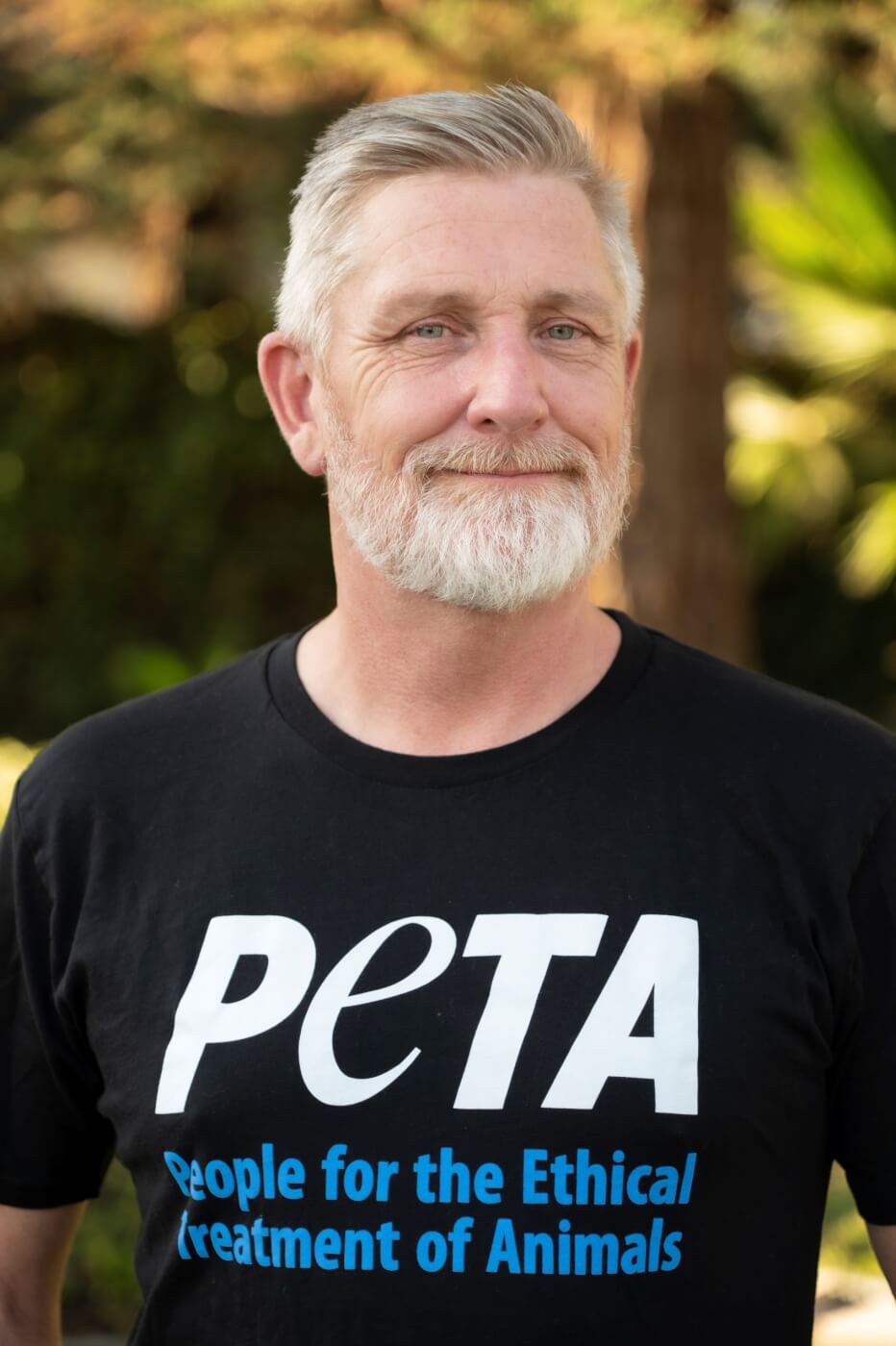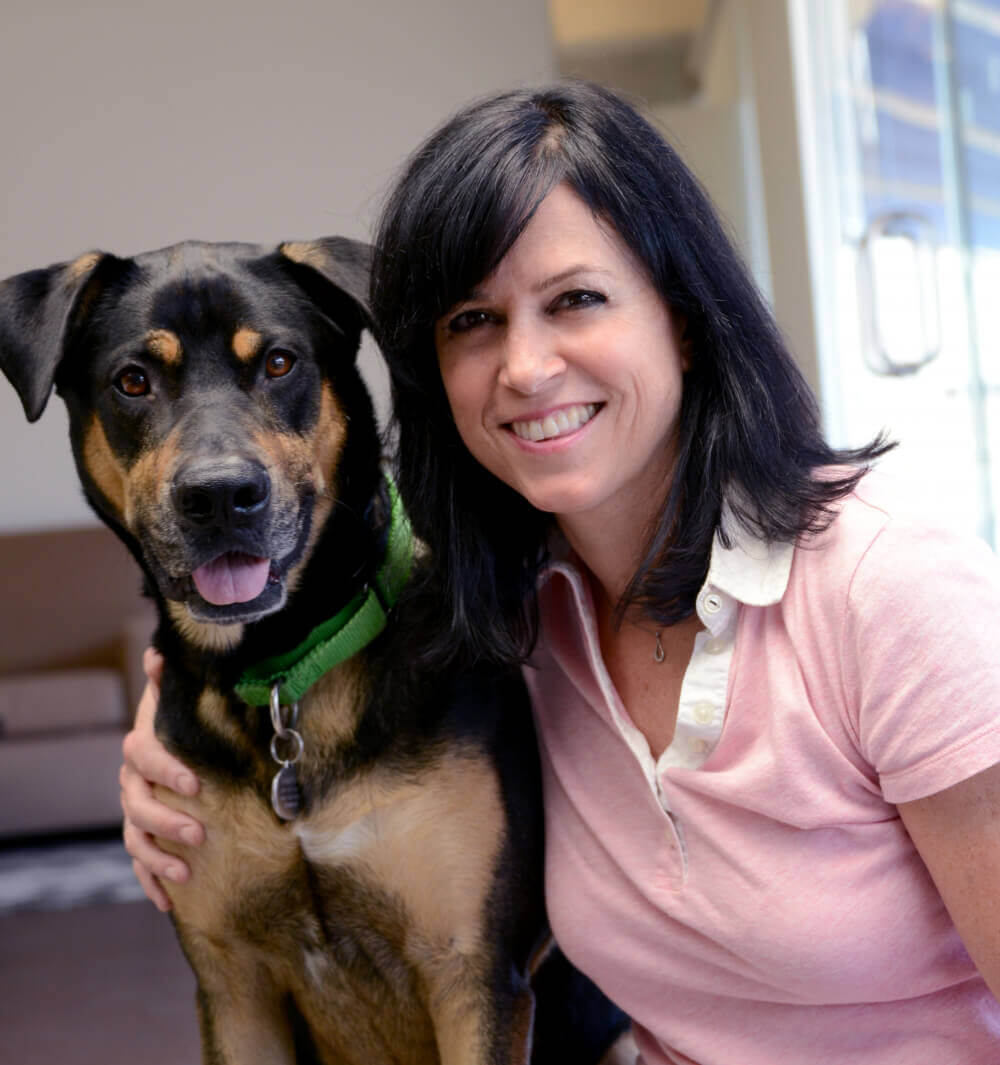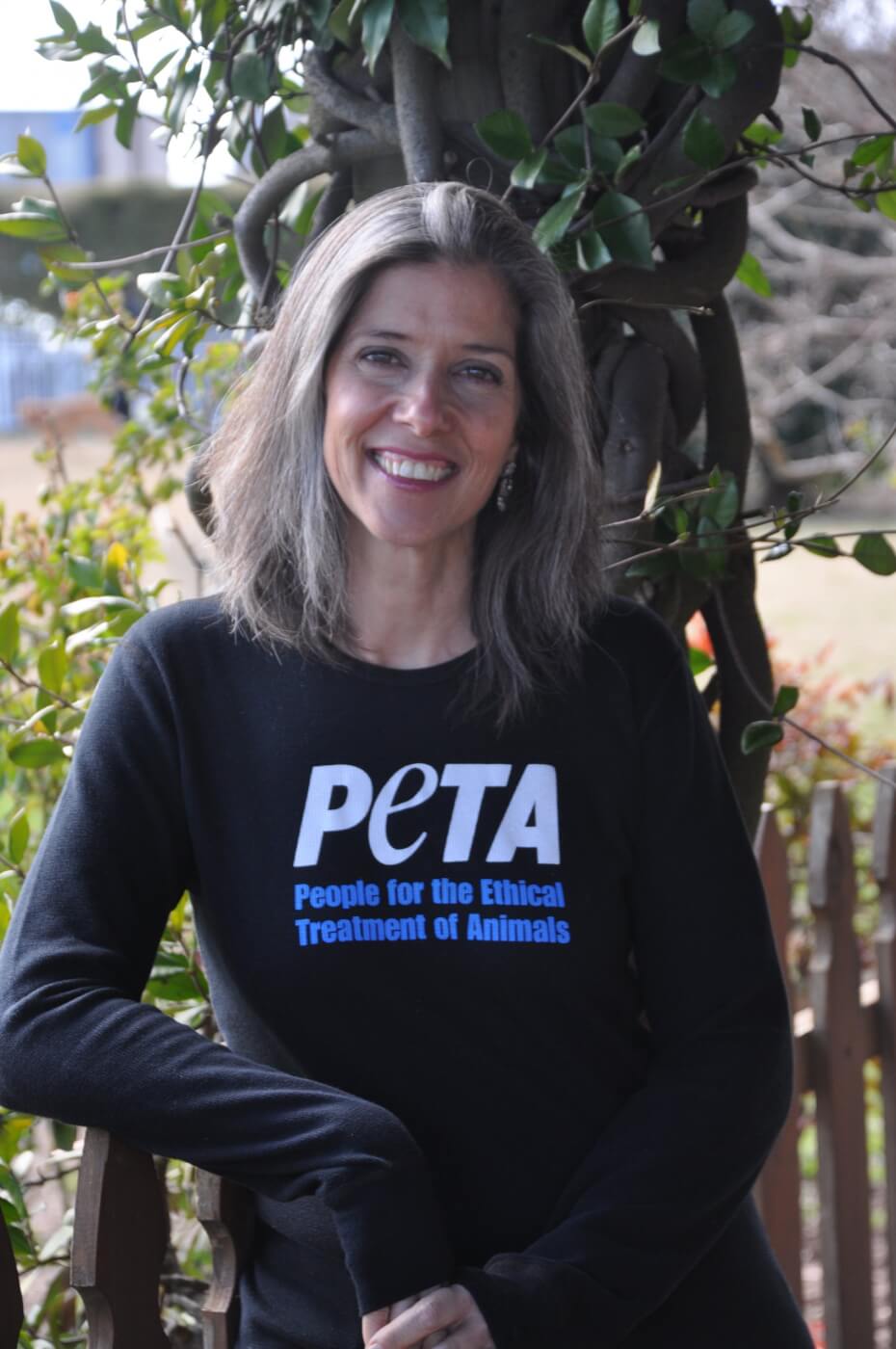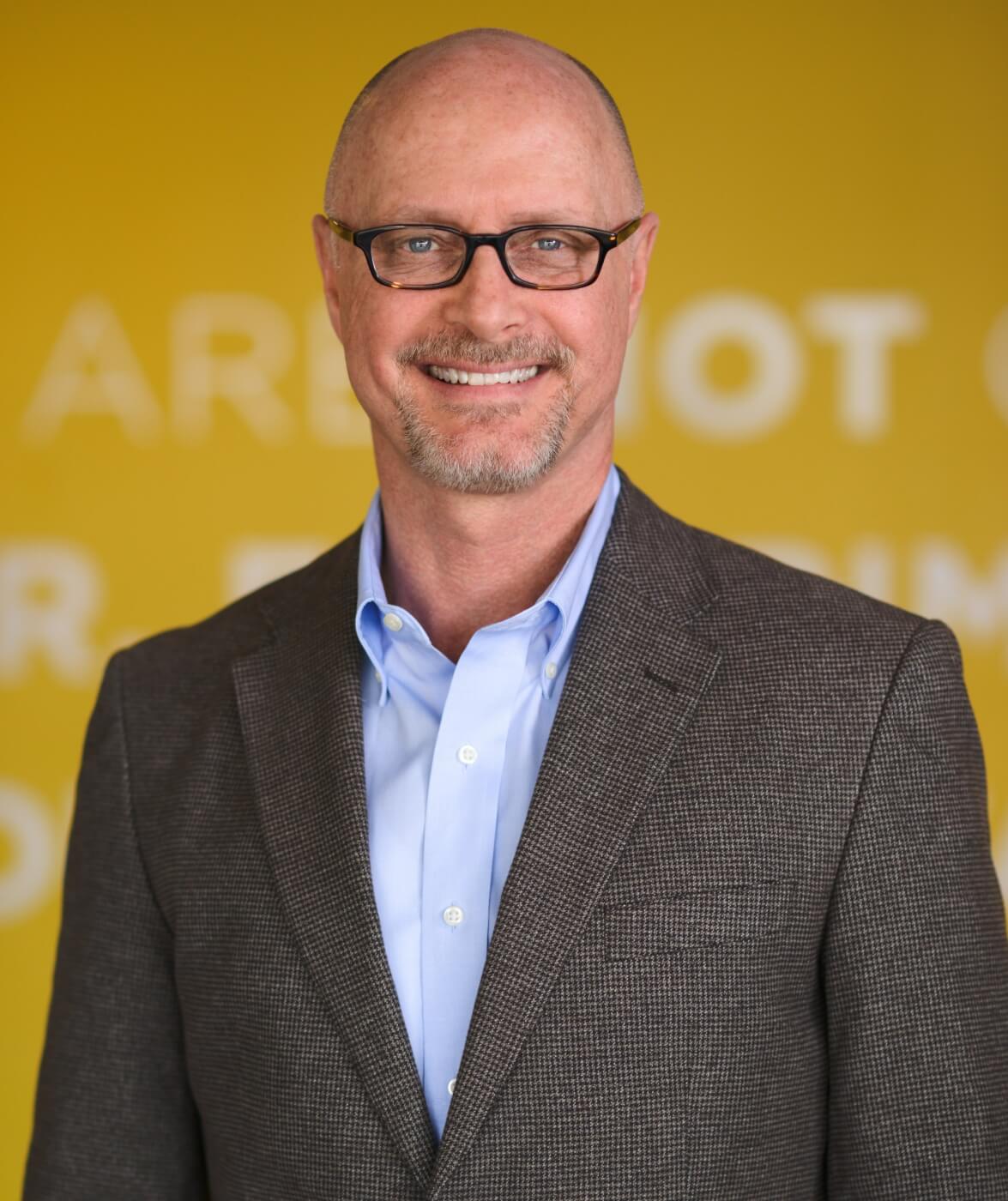Meet PETA and the PETA Foundation Leadership
Ingrid Newkirk
President, PETA

Since founding PETA, president Ingrid Newkirk has grown the group into the world’s largest animal rights organization. Her passion and dedication to making this world a better place for all living beings has inspired countless others to do what they can to help animals.
Ingrid and PETA believe that animals deserve the most basic rights—in particular, consideration of their own best interests regardless of whether they are useful to humans. Like humans, they are capable of suffering and have interests in living their own lives. Therefore, they are not ours to use for food, clothing, entertainment, experimentation, or for any other reason.
Tracy Reiman
Executive Vice President, PETA

As PETA’s executive vice president, Tracy Reiman oversees the organization’s international grassroots campaigns, online marketing and social media, corporate affairs, and youth outreach divisions.
Among her many roles, Reiman leads PETA’s successful efforts to pressure entities to adopt animal-friendly policies. Under her guidance, more than 100 top fashion brands have stopped selling fur, angora, wool, down, and exotic skins. She has led successful campaigns to stop Ringling Bros. and Barnum & Bailey Circus from using animals and to end SeaWorld’s orca-breeding program, convinced all the top 10 advertising agencies in the U.S. to pledge never to use great apes in their ads, and pushed Hallmark to stop featuring chimpanzees dressed in degrading costumes on greeting cards.
Reiman spearheads the planning and implementation of extensive—and sometimes controversial—publicity and educational initiatives to promote vegan food and clothing. As a result, vegan products like dairy-free ice cream and vegan chicken have gone from virtually nonexistent to available in every grocery store in the U.S. and beyond. Her oversight of PETA’s work to ban glue traps has led hundreds of companies and institutions to ban their use and sale and to the first citywide bans on their use in Ojai and West Hollywood, California. Reiman has been instrumental in creating and implementing new ways to mobilize young activists through online marketing and innovative, interactive technologies. She also oversees PETA’s online presence, which consistently engages more people via social media than any other nonprofit organization by a wide margin.
Early in her career at PETA, Reiman led successful efforts to persuade major oil companies—including Mobil, Texaco, and Shell—to cap their oil stacks in order to prevent thousands of birds and bats from burning to death. She also helped persuade Calvin Klein to become the first major clothing designer to abandon fur and helped stop NASA’s Bion project, which involved sending primates into space. She oversaw PETA’s precedent-setting campaign against McDonald’s, which led the fast-food giant to make groundbreaking changes affecting the treatment of animals on factory farms and in slaughterhouses. Her investigative and rescue work resulted in the first-ever cruelty charges against and conviction of a factory farmer for the mistreatment of chickens.
Reiman has been with PETA since 1991. She lives in Los Angeles.
Joel Bartlett
Senior Vice President of Marketing Engagement and Social Media

Joel Bartlett is the senior vice president of marketing engagement and social media at PETA. Since joining the organization in 2003, he has been instrumental in enhancing its online and social media presence. His innovative marketing strategies include the creation of engaging and educational video games such as Super Chick Sisters and Kitten Squad, which raise awareness of animal rights issues. In addition, he has leveraged emerging technologies like AI to create impactful campaigns, such as PETA’s version of the creation story, which highlights animal rights themes in a novel and engaging way.
Bartlett’s role at PETA encompasses overseeing online advocacy, e-mail marketing, and mobile marketing efforts. He has been integral to countless victories for animals, from persuading retailers to drop fur and angora products to shutting down animal testing laboratories and contributing to the closure of Ringling Bros. and Barnum & Bailey Circus, which has since returned but without animals. His leadership has driven PETA’s aggressive online advocacy campaigns, pressuring companies through social media and online videos.
Bartlett grew PETA’s social media presence from its early days, starting with platforms like Friendster. He has also been involved with peta2, PETA’s youth outreach program, since its inception and oversees the online initiatives of PETA Latino. Under his leadership, PETA has received numerous awards for its innovative advocacy, e-mail marketing, videos, mobile marketing, and social media efforts.
Bartlett lives in New York City.
Kathy Guillermo
Senior Vice President of Laboratory Investigations Department

As a senior vice president of PETA, Kathy Guillermo’s many duties include heading up the organization’s work to end the use of animals in voluntary experiments, leading its campaign for the end of cruelty in the horse racing industry, and overseeing production of The PETA Podcast.
Guillermo was originally hired to supervise PETA’s cosmetics-testing campaign in 1989—a campaign that she still oversees—and went on to lead the organization’s Laboratory Investigations Department, which is working to replace animals in laboratories. Some of the major victories by her team include pressuring NASA to scrap plans to irradiate monkeys, persuading the U.S. military to end all chemical-casualty training on monkeys, ending the Coast Guard’s shooting and stabbing of goats and pigs in medical trauma training drills, shutting down the construction of massive monkey-breeding facilities in Florida and Puerto Rico, persuading major airlines to stop transporting primates to laboratories, and ending invasive head experiments on cats, stress experiments on baby monkeys, and cruel near-drowning tests on mice and other small animals. Her work for horses has exposed abuse and led to major reforms in racing, including the implementation of the first-ever industry-supported retirement program for Thoroughbreds and the introduction and passage of regulations restricting drugging.
Guillermo’s 1993 book, Monkey Business: The Disturbing Case That Launched the Animal Rights Movement, with a foreword by Oliver Stone, details the cruelty case that launched the then-fledgling PETA into national prominence. The landmark Silver Spring monkeys case also led to the first-ever conviction of an animal experimenter on cruelty-to-animals charges.
Steve Kehrli
Senior Vice President of Development

Steve Kehrli is the senior vice president of fundraising at the PETA Foundation. Since joining the organization in 2007, Kehrli has enhanced its fundraising work both in the U.S. and internationally. He has expanded PETA’s donor base and increased donor engagement through personalized outreach and pioneering data-driven approaches.
In addition to fundraising, Kehrli helps lead PETA’s strategic planning and innovation projects and has successfully integrated emerging technologies into the group’s campaigns, raising global awareness of critical animal rights issues.
Kehrli’s strategic initiatives have led to numerous successful campaigns that have raised millions of dollars for animal rights and has helped achieve victories for animals, including by persuading fashion brands to eliminate fur from their collections and rescuing animals from exploitative exhibitors.
Kehrli lives in Washington, D.C.
Lisa Lange
Senior Vice President of Communications

As the senior vice president of communications for PETA, the largest animal rights organization in the world, Lisa Lange devises effective and eye-catching ways to get the animal rights message out to as many people as possible.
She has coordinated the production of some of PETA’s most successful videos and public service announcements (PSA), including the provocative “Redemption” ad, which stars actor James Cromwell as a priest who busts the myth of “humane meat”; the “Don’t Take My Cheese” 2024 Super Bowl ad, in which actor Edie Falco of The Sopranos delivers a thought-provoking performance; and the award-winning “Don’t Stand for Injustice” PSA, which pays homage to Colin Kaepernick’s famous kneel against injustice.
Lange has overseen the production of PETA’s anniversary galas, including PETA’s 40th Anniversary Gala and Humanitarian Awards show, which was cohosted by Falco and Alan Cumming. She also facilitated the production of I Am an Animal, an award-winning HBO documentary about PETA founder Ingrid Newkirk.
Based at PETA’s Los Angeles office, which she established, Lange works closely with the group’s Hollywood supporters, including Joaquin Phoenix, Bill Maher, Anjelica Huston, Mike White, and Casey Affleck. She also networks with directors, producers, and writers, convincing them to incorporate animal-friendly messages into TV programs and movies. In 2012, she launched PETA’s Animals in Film and Television division, which works to protect animals used in productions and expose the abuse of animals in the entertainment industry.
In 2012, she launched PETA Latino, which—with its huge social media presence and bilingual website, PETALatino.com—is the preeminent animal rights resource for the Latino community. Alongside celebrities like Kate del Castillo, Patricia De León, and Dulce María, the group’s massive campaign against bullfighting has led to groundbreaking bans on the blood sport in Colombia as well as the Mexican states of Coahuila, Guerrero, Quintana Roo, Sinaloa, and Sonora. Other major PETA Latino victories include successfully pushing for a ban on wildlife exhibitions in Quintana Roo and exposing horrific cruelty at a laboratory in Colombia, leading to its closure and the rescue of nearly 300 animals.
Lange leads PETA’s efforts to prevent the trapping and killing of coyotes. In 2017, she led PETA’s lawsuit against Arcadia, California, to stop the city’s plan to use cruel neck and leg snares in order to trap and kill coyotes. And in 2023, she helped convince the Pasadena City Council in California to adopt a humane coyote management plan and to avoid cruel, ineffective, and expensive lethal methods. In support of a petition that PETA filed in 2024, Lange and other PETA representatives urged California state authorities to ban gassing coyotes to death and prohibit private trappers from trapping and killing coyotes on public land.
A gifted speaker, she often represents PETA in the media and has been quoted by the Los Angeles Times, NPR, The Daily Show, and CNN.
Lange’s involvement in animal rights began when she went vegetarian as a teenager after seeing how animals are abused for meat. Before joining PETA, she organized anti-captivity campaigns for a marine-mammal conservation organization in California. She graduated cum laude with a degree in political science from Loyola University New Orleans.
Daphna Nachminovitch
Senior Vice President of Cruelty Investigations

As the senior vice president of PETA’s Cruelty Investigations Department, Daphna Nachminovitch has overseen countless cruelty cases and many eyewitness investigations. Her staff fields hundreds of calls every week from concerned complainants around the world.
In one high-profile case, Nachminovitch worked with state and federal officials in what may be the largest animal seizure in history: Nearly 27,000 animals were confiscated from international “exotic-”animal dealer U.S. Global Exotics in Texas. The company was shut down overnight, and its operator became a federal fugitive.
In another of Nachminovitch’s record-breaking cases, PETA’s investigation of Global Captive Breeders prompted law-enforcement officials to charge the company’s owner and manager with 106 counts of felony cruelty to animals. Sixteen thousand rats and 600 reptiles were seized from the facility in the largest seizure of rats in U.S. history and the largest-ever seizure of animals in California.
Nachminovitch oversaw PETA’s investigation into Professional Laboratory and Research Services (PLRS), a North Carolina product-testing company that closed within a week of the release of PETA’s findings to the public and put hundreds of animals up for adoption. A grand jury indicted four former PLRS workers, marking the first time in U.S. history that workers faced felony cruelty charges for abuse of animals in a laboratory.
Nachminovitch also directed PETA’s investigation into a pig factory farm that supplies Hormel, which resulted in six workers admitting guilt in the neglect and/or abuse of pigs—the first convictions of their kind in Iowa, the top pork-producing state. She also led PETA’s investigation into turkey factory farms in West Virginia, which resulted in the first-ever felony indictments for abusing factory-farmed birds. The case led to five convictions and the stiffest penalty ever imposed in U.S. history for cruelty to any farmed animal.
Based on evidence supplied by a PETA undercover investigation, the U.S. Department of Agriculture cited Pennsylvania-based Triple F Farms for numerous violations of the federal Animal Welfare Act for leaving baby ferrets who had fallen through cage floors to die on the ground and depriving ferrets with painful, life-threatening injuries of veterinary care or euthanasia.
Evidence collected by Nachminovitch’s team at a self-proclaimed animal “hospice” called Angel’s Gate Inc. in New York led to its owner being charged with 22 counts of cruelty to animals. PETA’s investigator documented that animals kept in filthy conditions were denied medical treatment for pain, seizures, tumors, open wounds, and infections. Nachminovitch also oversaw a landmark hoarding case involving Caboodle Ranch, a filthy “sanctuary” in Florida, from which nearly 700 cats—many of them severely ill—were seized.
Under Nachminovitch’s direction, PETA investigators have documented abuse at Ringling Bros. and Barnum & Bailey Circus, Petco, and PetSmart suppliers Rainbow World Exotics and Sun Pet Ltd., and a Pennsylvania dairy farm that supplies milk to Land O’Lakes.
After a first-of-its-kind undercover investigation directed by Nachminovitch into one of the world’s largest alpaca wool producers revealed that crying alpacas were roughly shorn, cut into, and left bleeding from deep wounds, PETA persuaded major companies—including UNIQLO, Overstock.com, and ESPRIT—to ban alpaca wool. Following PETA’s investigation, authorities in Peru charged five shearers with cruelty to domestic animals, a historic first in the alpaca industry.
After PETA’s exposé led to the closure of The Pet Blood Bank in Texas, a filthy dog-blood farm, and the rescue of 151 greyhounds, the greyhound racing industry adopted long-overdue standards on blood banks. Because of the work of Nachminovitch’s team, the National Greyhound Association barred its members from directly sending greyhounds to any blood bank operation, established rules for the length of time dogs can be used for their blood, and began requiring spaying or neutering, veterinary exams, and that they subsequently be given a chance at adoption.
A vigorous campaign led by Nachminovitch in Virginia resulted in the enactment of historic “beagle bills” that provide protections for animals bred and sold for experiments. Undercover footage captured by PETA ignited calls for reform and oversight at the massive Envigo breeding facility in Cumberland, Virginia. PETA’s evidence prompted U.S. officials to cite the facility for dozens of violations of law and execute a search warrant there. Envigo pleaded guilty to a criminal charge of conspiracy to violate the federal Animal Welfare Act and a felony charge of conspiracy to violate the federal Clean Water Act. These first-ever federal convictions of a supplier of animals for experimentation left Envigo facing more than $35 million in penalties, including a $22 million fine. Following PETA’s investigation and the government’s actions, the Cumberland facility closed, and nearly 4,000 beagles were released for adoption.
Under Nachminovitch’s direction, PETA supplied evidence to local and federal law-enforcement officials in Houston, Texas, that led to the first conviction for the production and distribution of sadistic “crush videos” in violation of the federal Animal Crush Video Prohibition Act of 2010.
Nachminovitch also oversees PETA’s low-cost spay/neuter clinics, which have “fixed” more than 234,000 animals since the program’s inception in 2001. She directs PETA’s Community Animal Project fieldwork and doghouse program based in Norfolk, Virginia, which provides custom-made doghouses, straw bedding, toys, and other services to neglected dogs in southeastern Virginia and northeastern North Carolina. She has successfully worked with government officials to pass laws banning or restricting the chaining of dogs in numerous jurisdictions, including Virginia.
Based on evidence provided by Nachminovitch and her team, officials in Bertie County, North Carolina, charged a woman with seven counts of cruelty to animals for the death of a dog found starved, lying in her doghouse and still chained, as well as six other dogs kept chained in the yard. PETA filed an innovative civil lawsuit to eliminate the possibility that the dogs seized by law enforcement would be returned to their owner and gained permanent custody of them. The woman pleaded guilty to one count of misdemeanor cruelty to animals and was banned from acquiring animals.
Under Nachminovitch’s direction, PETA has expanded fieldwork and spay/neuter services to include underserved communities in rural southwestern Virginia as well as in Mexico and Puerto Rico. Thousands of animals have been sterilized, and hundreds more have received doghouses through these programs developed in collaboration with local shelters and clinics.
Born in Israel, Nachminovitch has lived in the Ivory Coast and Paris and is fluent in Hebrew, French, and English. She graduated from the University of Illinois Chicago with a major in communications and theater.
Colleen O’Brien
Senior Vice President of Media Relations

Colleen O’Brien is the senior vice president of media relations for PETA. She oversees PETA’s media and advertising divisions and their efforts to get the animal rights message into the news and out to the public. Under her guidance, PETA’s activities and campaigns have made headlines in major newspapers and magazines and on radio stations and television networks around the world.
Jeff Kerr
Chief Legal Officer, PETA Foundation

As chief legal officer to PETA and other PETA entities for nearly 30 years, Jeff Kerr is the longest tenured general counsel of any animal protection organization. He built and leads the world’s largest legal team working for animal rights. His team was named Corporate Counsel magazine’s 2017 Best Legal Department, the first animal protection group and only the second nonprofit to receive that honor. His high-profile cases have made headlines around the world and sparked a global conversation about the legal rights of animals.
Since 2013, his team has successfully mounted six constitutional challenges to defeat “ag-gag” laws, which are designed to prevent eyewitness investigations of animal abuse that are vital for exposing and ending cruelty to animals. In October 2011, he led the PETA legal team that conceived of and litigated the landmark case Tilikum v. SeaWorld, which sought the release—under the 13th Amendment to the U.S. Constitution—of five wild-caught orcas enslaved by SeaWorld. It was the first-ever lawsuit seeking constitutional rights for animals. He led the legal team in the groundbreaking case Naruto v. Slater et al., which sought copyright ownership of the famous “monkey selfie” photograph for the macaque who took the photo. This was the first case in legal history asking that an animal be declared the owner of property (the copyright) rather than being considered a piece of property himself. The case sparked international debate about animal sentience and creativity and is being taught in law schools around the country. And his litigation team has eviscerated the big-cat cub-petting and -breeding industry with a string of precedent-setting victories under the Endangered Species Act and has put out of business, in jail, or under indictment nearly every tiger abuser featured in the Netflix series Tiger King. Kerr’s team is now battling false humane-washing claims in which the meat, egg, dairy, and other industries’ false claims like “humanely raised” and “free-range” and bucolic images of cows roaming lush green pastures, to prevent them from misleading consumers who care about the treatment of animals.
Kerr’s team has helped PETA set more precedents for animals than any other organization, including the first cruelty-to-animals convictions of factory farm employees for abusing pigs and birds, the first U.S. and international crush video convictions (including a life sentence), the first British case upholding the right to show eyewitness footage of animal abuse, the first Australian case upholding the right to call for a product boycott against animal-abusive practices, the first state supreme court decision recognizing the right to gather and publicize eyewitness animal abuse video footage, and the largest seizure of animals in U.S. history.
Kerr also established and serves as general counsel for each PETA entity—in Australia, France, Germany, Hong Kong, India, the Netherlands, Switzerland, and the U.K. He has helped PETA and other PETA entities defeat politically motivated attacks on their ability to speak out effectively in behalf of animals, including through the following accomplishments:
- Thwarted three U.S. congressional inquiries—supported by industries that exploit animals—that attempted to revoke PETA’s tax-exempt status
- Guided PETA and the PETA Foundation through a 20-month politically motivated IRS audit
- Coauthored “friend-of-the-court” briefs before the U.S. Supreme Court and other federal and state courts to support the First Amendment rights of PETA staff members and volunteers
- Defended the right to show the public eyewitness video footage of animal abuse in the Fairfax County, Virginia, laboratory Covance Inc.—the world’s largest contract experimentation laboratory
- Exposed the decade-long conspiracy by Ringling Bros. and Barnum & Bailey Circus to interfere with the activities of PETA and other animal protection groups that oppose the cruel beatings and confinement of elephants, tigers, and other animals who are used by circuses
- Defeated a strategic lawsuit against public participation (SLAPP) brought by UniverSoul Circus that sought to silence PETA’s truthful publication of the circus’s deplorable record of supporting abusive exotic-animal exhibitors
- Defeated the Australian wool industry’s lawsuit that sought to silence PETA’s international call for a boycott of Australian wool produced through the sheep-mutilation process known as “mulesing”
- Fended off malicious prosecution charges brought by animal abusers in state and federal court in order to protect PETA’s ability to bring criminal and civil complaints against people who harm animals
- Secured the PETA.org internet domain name from a cyber squatter who sought to use it to support animal exploitation
Kerr has also defended “naked” activists and costumed protesters wrongly targeted by law-enforcement officers who attempted to silence their right to speak out for animals, and he protects PETA and other PETA entities from libel and slander.
In addition, he also serves on the executive team responsible for the organization’s strategic financial planning and management.
Kerr graduated from the University of Virginia School of Law, which in 2018 recognized his body of public service work with the prestigious Shaping Justice Award for Extraordinary Achievement. He completed his undergraduate studies at George Mason University, where he was a Weber Scholar. He joined PETA in 1993, shortly after attending a lecture titled “Did Your Food Have a Face?” He has 40 years of litigation experience with corporate and tax-exempt organizations and has lectured about animal law at law schools across the country, including Harvard University, New York University, Columbia University, the University of Virginia, Georgetown University, and Lewis & Clark College. His legal career and work for PETA have been profiled in The Wall Street Journal, The New York Times, The Washington Post, The Times, Time magazine, InsideCounsel magazine, and Corporate Counsel magazine as well as on the U.S. website LawCrossing.com and the U.K. website TheLawyer.com, together with scores of other national and international media outlets. He also served on the board of directors of the American Civil Liberties Union of Virginia for 10 years, chairing its policy and legal committees and serving as president for the last two.

